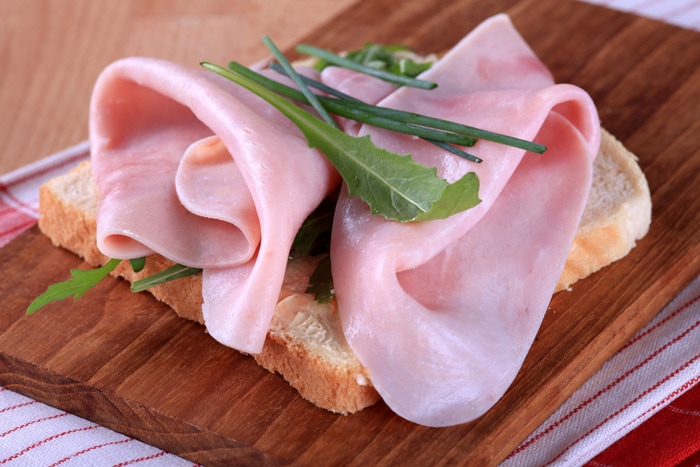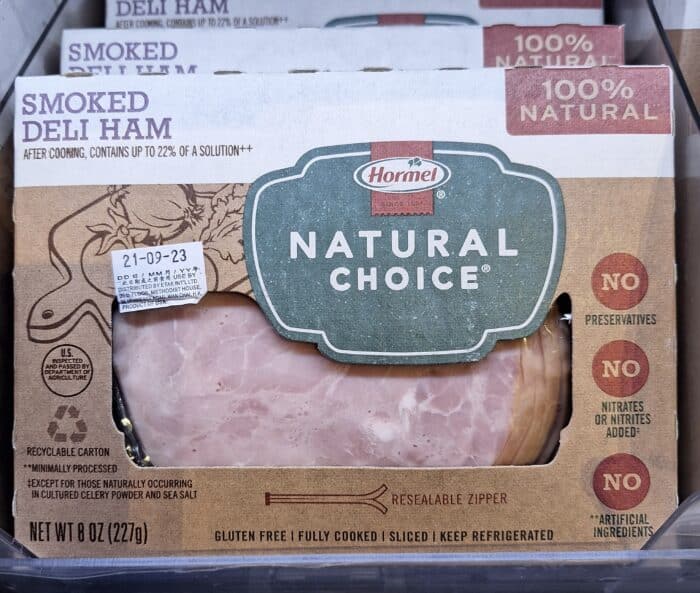
Written By: Gloria Tsang, RD
Title: Founding Registered Dietitian
Alumni: University of British Columbia
Last Updated on:

You may have come across natural, organic, or nitrate-free ham in the grocery stores. Ever wonder if they are better than conventionally processed ham?
Processed meats are conventionally cured or preserved with food additives called sodium nitrite or sodium nitrate; in Europe or parts of Asia, they may be listed on the ingredient list with their respective food additive codes E250 or E251. Sodium nitrite and nitrate are used to preserve meat and prevent food-borne illness such as botulism. They also give cured meats their distinctive pink color and “cured” flavor. However, these added nitrates or nitrites can react with amino acid byproducts in your digestive tract (or in the meat itself) to form nitrosamines, a known carcinogen. A large, multi-year study of over 500,000 participants done by the National Cancer Institute found an increased risk of several types of cancers that are associated with processed meat sources of dietary nitrates or nitrites, such as bladder cancer and pancreatic cancer. In 2015, the International Agency for Research on Cancer (IARC), an arm of WHO World Health Organization announced that consumption of processed meat is carcinogenic to humans (Group 1 ), based on sufficient evidence that the consumption of processed meat causes colorectal cancer.

The label stating “natural, “uncured,” or “no nitrates or nitrites added” simply means that no sodium nitrate or sodium nitrite additives were added to cure the meat. Instead of sodium nitrite, these natural or uncured ham are preserved with a more natural ingredient, usually celery juice powder or celery extract. Celery juice contains natural nitrite, which helps preserve meat. Often, beet juice extract or cherry extract is added to give that pink color.
The following is a common brand of ham without added sodium nitrates:

However, celery powder still contains nitrites and nitrates. What it really means is:
Some vegetables are naturally high in nitrates – including celery, lettuce, spinach, beets, radishes, and carrots. However, we don’t need to worry about these high-nitrate vegetables, as they usually contain phytonutrients or vitamins that act as antioxidants, which can presumably counteract the carcinogens formed. In addition, vegetables do not contains protein and amino acids, preventing the formation of carcinogenic nitrosamines.
No study has confirmed the safety of using celery extract, juice, or powder in curing meats, according to Dr. Roger Clemens, a food ingredient expert and president of the Institute of Food Technologists. In addition, being “natural” does not mean it’s safer, healthier, or nutritionally superior. After all, celery juice powder or extract is just an ingredient, not a whole food.
Celery extract, juice, or powder used in curing meats is not free of nitrates or nitrites, so buyers beware! Using vegetable-derived extract as a source of nitrates for curing meats does not address the real issue on hand: eating less processed foods and reducing sodium nitrate or nitrite additives.
Alumni: University of British Columbia – Gloria Tsang is the author of 6 books and the founder of HealthCastle.com, the largest online nutrition network run by registered dietitians. Her work has appeared in major national publications, and she is a regularly featured nutrition expert for media outlets across the country. The Huffington Post named her one of its Top 20 Nutrition Experts on Twitter. Gloria’s articles have appeared on various media such as Reuters, NBC & ABC affiliates, The Chicago Sun-Times, Reader’s Digest Canada, iVillage and USA Today.
cancer diet, grocery aisle, ham, nitrate free ham, nitrates, nitrites, organic, uncured ham
it was 3 yrs ago. right after we bought a HEB precooked large spiral cut ham. we had a lot of it left over not eaten at our family party.
it was getting old now and sticky from the fats breaking down sooo.
i washed and fried some and was delish.
sooo
next day i dropped the whole ham in a pot and sliced and removed the bone and fat . lots of picking and washing and cutting soaking.
Almost there.
rinshing in a strainer almost perfect.
plopping it into a bowl then it begins. I am ultra dizzy. OMG ugg.
i tell wife i have to go lay down I am sick all of sudden.
i cannot do anything but lay but my head is spinning my eyes are jerking side to side like watching speeding cars pass.
even when i try to close my eyes.
get me a bucket . i am dizzy and toss . ugg
what can i do she is crying . i donno just leave me for a while.
i get sicker and more dizzy as if that is possible.
i have enough sense to know whats happened to me. nitrate poisoning it fell into my body as i washed/deboned the ham.
we call poison control center and the lady looks it up an says to call ambulance to go to have my blood thinned intravenously or replaced .
but do you know what that will cost its 1000.00 to just have them come here and 1000’s more for that to be done to me . there must be another way . but she argues that is all there is but she is wrong.
so i decide to wait as i know when your poisoned your lips and blood will trun blue . i ran test on my blood color and blood pressure and sugar.
so next day i could read i googled the nitrate poison on websites it said to use massive amounts of vitamin C. so i did and i added Dramamine too so i’d not stay dizzy when i moved or looked around.
boy did that effect still stay with me and like the articles said it lasted 10 full days but on the 6th i was able to replace her battery in car. but was limited with eye sight . no quick movements . long and steady no back and forth quickly or might puke.
i found nitrates in meats are not to be given to weak or very young.
so next year we gave up on finding any meat of anykind w/o nitrates they all had it . and i find they dry things like celery or veggies concentrating the nitrates in them so they can say uncured no nitrates added. liars.
that year we did sausage links that said NO NO NO .. no nitrates , no preservatives , no MSG.
no amount of poison is good for your brain no matter who you think you are.
do you get a little drunk in the brain or just drunk.
no amount of alcohol is good for your brain. no matter what you think.
poison is poison.
oh did you know msg happens in nature .. duhhh .but it does no happen then the concetrations that we produce by drying it.
nightshades in veggies are poisons too but only effect is that your skin will break out in brown spots as its passed from gut to skin . unless you concentrate it then it will kill ya.
with msg i ended up in bed for 2 days by eating a slice of pizza from pizza hut . i warned them . they ignored so i started a vendetta and in years after 2000 they found no one would eat the pizza they shut down hundreds of restaurants now ony pickup and go. but guess what ..no msg.. ha . the power of the internet .
i wanted someone to produce my trial by nitrates so ended up here hope you can use it lemee know.
karl